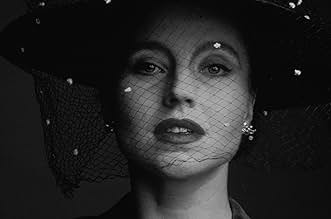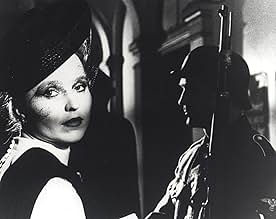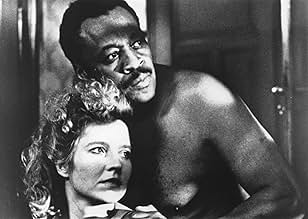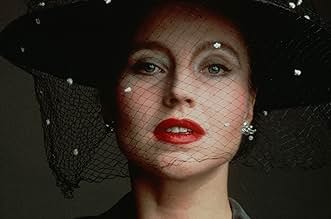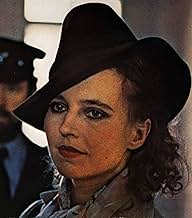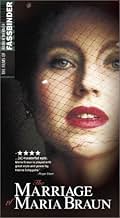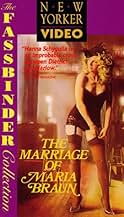Maria marries Hermann Braun in the last days of World War II, only for him to go missing in the war. Alone, Maria puts to use her beauty and ambition in order to find prosperity during Germa... Read allMaria marries Hermann Braun in the last days of World War II, only for him to go missing in the war. Alone, Maria puts to use her beauty and ambition in order to find prosperity during Germany's "economic miracle" of the 1950s.Maria marries Hermann Braun in the last days of World War II, only for him to go missing in the war. Alone, Maria puts to use her beauty and ambition in order to find prosperity during Germany's "economic miracle" of the 1950s.
- Awards
- 13 wins & 7 nominations total
- Bill
- (as George Byrd)
- Hans Wetzel
- (as Günther Lamprecht)
Featured reviews
An intelligent but strangely lifeless allegorical work
The Marriage of Maria Braun is a film that operates on two different levels. On the one hand in can be seen as a look at one woman's struggle against adversity in the hardships of the post war years. While on another, the film can clearly be read as a critique of the way the new Germany forgot it's awful past and sold it's soul in order to prosper in what would become known as the German Economic Miracle. This latter reading can be determined by reading the main narrative as an allegory in which Maria Braun represents the new Germany. She begins by prostituting herself to the Americans and ends very wealthy but emotionally dead; she forgets her past quickly in order to concentrate on her future.
There is no doubt that Rainer Werner Fassbinder put together a clever allegorical film here. And there is also no doubt that Hanna Schygula is very good in the lead role. But I did have difficulty with empathising with the people in this story, as none of them were particularly likable. Perhaps that was the point of course. But, whatever the case, the film left me cold unfortunately.
Germany Reborn
In the rubble of the Second World War, Maria/Germany survives, between a tenuous hope of returning to the lost past and the agony of a miserable and dishonorable present.
But the defeated have no right to shame. It is up to them to rebuild the future in the bed of the victors, until they learn to live without them, more than autonomously, as new victorious powers, taking the place of those who humiliated them. In life, in the economy or even in football (Fassbinder coincides the narrative climax with the 1952 World Cup final, in which Germany became champion, for the first time in the history of the competition, thus using yet another metaphor for German reconstruction).
After the victory is complete, the honor is washed away, life ends and it is time to give way to others, to the future, which must not repeat the mistakes of the past.
A bold message and a powerful performance by Hanna Schygullla.
Fassbinder at his best.
Rainer Fassbinder at his peak
The Marriage of Maria Braun is a great film without needing to be dissected as some dull academic thesis paper. Maria depicted quite spectacularly by Hanna Schygulla, she plays a character who I can't really decide is tragic or the real "villain." This is one of those weird films where every character is so endearing and well written that it's painful to see things go so off the rails for them.
Ending was a little obvious, and I could argue it was too dumb for the rest of the movie, but overall an amazing production.
A tale of how Germany was rebuilt by women following the horrors of World War Two.
Without wishing to give too much away, it tells the tale of a woman who, seeing the desolate landscape that Germany was in 1945, determines to build herself a comfortable life and, as she does so, she becomes one of many women in Germany rebuilding the nation. This was a time, historically, when the women were a greater driving force in the social and economic rebuilding of the nation than were the men (who were both lacking in credibility following the horrors and the mess of the years past, and somewhat dazed by what the nation had just been through).
As she builds that life (and in so doing helps to rebuild the nation), however, she finds that she may have sacrificed too much.
It is a movie worth watching in order to gain some understanding of what life was like in Germany from 1945 to roughly 1970. Rainer Fassbinder makes use of images in places which show the transition of German society from broken ruins to economic superpower, the changing status of women in German society over that time period, the changing attitudes both within Germany and from outside toward Germany, and the sacrifices that women were prepared to make in order to build the Germany that they ultimately did. It also asks, though, if the single-minded pursuit of rebuilding the nation economically and materially did not take too much out of the nation and the people in other areas.
I enjoyed the movie, and am happy to recommend it.
Fraulein Mildred Pierce
The story in a nutshell is of almost war widow Maria Braun rebuilding her life in post war Germany & rising high on the corporate ladder till she realises that she has given too much of herself for the climb to enjoy the cause she was climbing for.
Standing by itself, I still think this movie will appeal either to European baby boomers or serious students of Fasbinder. The narrative is straight forward & the final TV audio track is a brilliant touch. Hanna Schygulla as Maria gives yet another great performance for Fasbinder.
Did you know
- TriviaInspired by "Mutter Courage und ihre Kinder" (1938/39), a play by Bertolt Brecht, and Baby Face (1933).
- GoofsAt the end of the cut of the two kids blowing up the firecrackers, they start laughing but no sound is heard. The sound of laughter is heard on the next cut after they get yelled at by the man scavenging for wood.
- Quotes
Maria Braun: I'm a master of deceit: a capitalist tool by day, and by night an agent of the proletarian masses - the Mata Hari of the Economic Miracle.
- Crazy creditsAt the very end of the credits the following persons are 'credited' by their picture: Konrad Adenauer, Ludwig Erhard, Kurt Georg Kiesinger and Helmut Schmidt and a disconnected phone line can be heard.
- SoundtracksIn The Mood
Written by Wingy Manone, Andy Razaf and Joe Garland
- How long is The Marriage of Maria Braun?Powered by Alexa
Details
- Release date
- Country of origin
- Official sites
- Languages
- Also known as
- Brak Marije Braun
- Filming locations
- Production companies
- See more company credits at IMDbPro
Box office
- Budget
- DEM 1,975,000 (estimated)
- Gross US & Canada
- $8,144
- Opening weekend US & Canada
- $11,623
- Feb 16, 2003
- Gross worldwide
- $12,119


